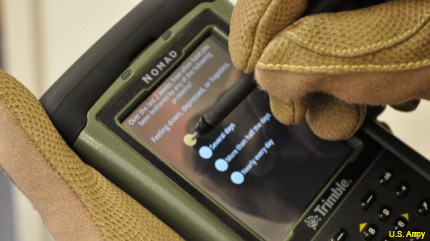Army set to field smartphone app to diagnose brain trauma
The DANA application can identify symptoms of traumatic brain injuries in any setting and in a little as five minutes.

The DANA app recently was cleared by the Food and Drug Administration.
The Army is working with a “brain thermometer” smartphone application that could help medical personnel identify traumatic brain injuries in any setting and in a little as five minutes.
The app, the Defense Automated Neurobehavioral Assessment, or DANA, has been cleared by the Food and Drug Administration and is in the process of being validated for battlefield use, the Army said in a release.
Identifying and treating brain trauma is a growing priority for the military, as doctors and scientists learn more about its effects. In 2013, more than 27,000 cases of traumatic brain injury were diagnosed worldwide in the four military services, nearly triple the number diagnosed when the Defense Department first started tracking brain injuries in 20000.
DANA could help with on-the-spot diagnoses by recording the reaction times of service members in an app that essentially operations as a video game. The app, which can run of a variety of mobile platforms and is being tested for use on tablets as well as smartphones, consists of a series of onscreen exercises designed to test speed and accuracy.
To start with, service members will perform the exercises to establish baseline performance levels. When a service member with a possible head injury takes the test, those results will be compared to the baseline. The cognitive and psychological components of DANA can help identify symptoms related to traumatic brain injury and post-traumatic stress disorder, the Army said. Among the factors that can affect reaction time are concussion, dementia, post-traumatic stress, depression and fatigue.
"In essence, measuring reaction time is like taking the temperature of the brain," said Corinna Lathan, founder and CEO of AnthroTronix, which created DANA. "It's a vital part of the data that any health professional needs to evaluate his patient."
Once validated for battlefield use, the Army said DANA could be used in the field to assist medical personnel, as well as to assess fitness for duty and perform triage.
"This is what's important right now," said Lt. Col. Chessley Atchison, program manager for the Technology Enabled Capability Demonstration: Brain in Combat portfolio of the Combat Casualty Care Research Program, "And once we get it right, we're going to put it fairly far forward in the field."



